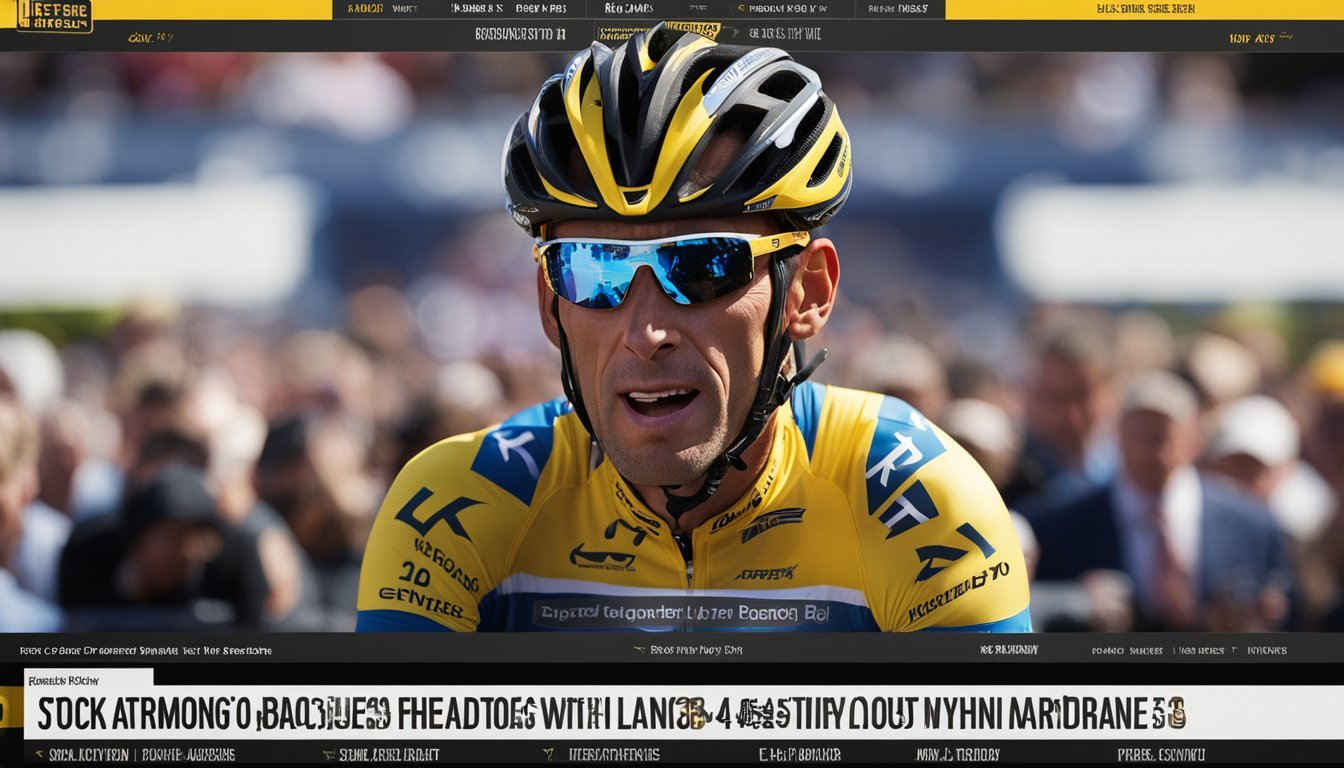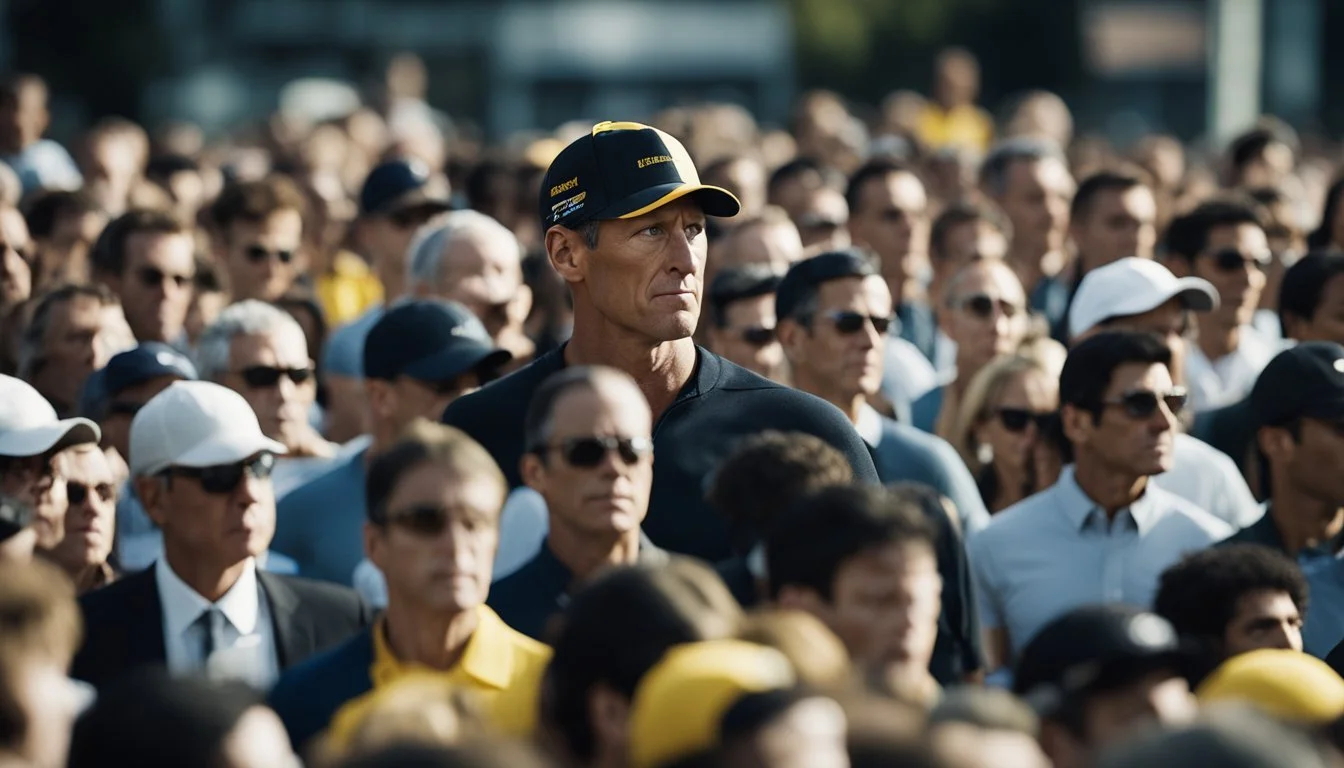Lance Armstrong's Apology and Its Reception in Austin and Beyond
A Community Divided
Lance Armstrong's confession to doping, broadcasted during his interview with Oprah Winfrey in January 2013, marked a significant turning point in the world of professional cycling. The Austin native's admission of using performance-enhancing drugs throughout his career came after years of vehement denials. This moment not only shocked his fans and the broader sports community but also profoundly impacted his hometown of Austin, Texas.
The reception of Armstrong's apology was mixed, with many feeling a deep sense of betrayal. In Austin, where Armstrong had once been celebrated as a local hero, reactions were particularly poignant. Some residents acknowledged the courage it took to come clean, while others could not forgive the dishonesty and the damage done to the sport of cycling.
Beyond Austin, the global community also grappled with Armstrong's mea culpa. Critics scrutinized the sincerity of his apology, noting the careful framing and the timing of his confession. Nonetheless, the disclosure marked the end of an era, offering a critical reflection point on the consequences of doping within professional sports.
Lance Armstrong's Legacy
Lance Armstrong's journey encompasses his rapid rise to cycling stardom, his contributions to the cancer community, the controversies surrounding doping allegations, and his eventual fall from grace.
Rise to Fame
Lance Armstrong, a cyclist born in Austin, Texas, made headlines with his remarkable victories in the Tour de France. He emerged as a dominant figure in professional cycling by winning the prestigious race seven consecutive times from 1999 to 2005. Armstrong's achievements were seen as extraordinary, especially given his comeback after battling testicular cancer.
Impact on Cancer Community
Armstrong's success extended beyond cycling. After his cancer diagnosis in 1996, he founded the Livestrong Foundation. The organization raised significant awareness and funds for cancer research and support. Armstrong's story provided hope to many cancer patients and survivors, and Livestrong became synonymous with resilience and determination, significantly impacting cancer advocacy and community support.
Doping Allegations
Despite his accomplishments, Armstrong's legacy is marred by allegations of using performance-enhancing drugs. The United States Anti-Doping Agency (USADA) led investigations that eventually confirmed the use of banned substances by Armstrong and his teammates. Evidence showed that he had utilized a sophisticated scheme involving various performance-enhancing drugs, which led to his lifetime ban from professional cycling in 2012.
Fall From Grace
The confirmation of Armstrong's doping shattered his reputation. He was stripped of his seven Tour de France titles, resulting in widespread public disappointment. His admission of guilt during an interview with Oprah Winfrey in 2013 did little to redeem his standing. This fall from grace marked the end of his celebrated career and cast a long shadow over his previous achievements.
The Doping Scandal
Lance Armstrong's doping scandal shook the world of professional cycling and tarnished his previously celebrated career. This section details the critical aspects of the scandal, from the investigation to the loss of his Tour de France titles.
Investigation by USADA
The U.S. Anti-Doping Agency (USADA) spearheaded the investigation against Armstrong, building a comprehensive case based on extensive evidence and testimonies. USADA charged him with using and encouraging the use of banned performance-enhancing drugs like EPO, steroids, and human growth hormone.
Their investigation revealed how Armstrong's doping scheme was systematically executed with the help of team doctors and staff. Evidence gathered included financial records, emails, scientific data, and sworn testimonies from former teammates.
Evidence of EPO Use
The substance at the heart of Armstrong's doping was Erythropoietin (EPO). EPO is a hormone that stimulates red blood cell production, enhancing an athlete's endurance. Investigators found blood samples and test results showing abnormal levels of EPO in Armstrong's system.
There were also documents detailing how EPO was transported and administered before significant races. These findings were corroborated by testimonies from multiple team members who witnessed or participated in the doping practices.
Teammates' Testimonies
One of the most compelling aspects of the scandal was the testimonies from Armstrong's teammates. Key riders from the U.S. Postal Service cycling team provided detailed accounts of the doping operations. They described how Armstrong not only used performance-enhancing drugs but also encouraged and pressured his teammates to do the same.
These testimonies painted a vivid picture of a culture of doping permeating the team, orchestrated to secure victories in the Tour de France and other competitions. The credibility and consistency of these witnesses significantly strengthened USADA's case.
Stripped Tour de France Titles
As a direct result of the investigation, Armstrong was stripped of his seven consecutive Tour de France titles by the International Cycling Union (UCI). This was an unprecedented move in the cycling world, symbolizing the profound impact of Armstrong's actions on the sport.
The UCI's decision ended years of denial by Armstrong and marked one of the most significant embarrassments in professional sports history. His Olympic medal was also stripped, cementing the scandal's far-reaching consequences on his legacy and the perception of professional cycling.
Public Confession
Lance Armstrong's public confession marked a dramatic turn in his career and had significant impacts on different communities. The key moments of this admission were highlighted during his interview with Oprah Winfrey.
Interview with Oprah Winfrey
In a well-publicized interview with Oprah Winfrey on January 17, 2013, Lance Armstrong admitted to using performance-enhancing drugs. The session was structured meticulously, where Oprah asked probing questions that Armstrong responded to candidly.
The interview aired on two consecutive nights, capturing the attention of a broad audience. Winfrey's reputation for securing path-breaking interviews added credibility to the session, which saw Armstrong addressing allegations and past denials.
Admission of Drug Use
Armstrong's admission of drug use was a complete reversal from his previous staunch denials. He revealed his use of EPO, blood transfusions, and other banned substances throughout his cycling career.
The confession included detailed acknowledgments of how he orchestrated his doping practices, supported by a well-organized system within his teams. Armstrong's statements clarified the extent of drug use and deceit, shaking trust in his achievements.
Reaction from the Cycling Community
The reaction from the cycling community was swift and varied. Many felt betrayed by Armstrong, a figure once celebrated for his victories and his inspirational battle against cancer. The Livestrong Foundation, which Armstrong founded, experienced a significant backlash, seeing diminished support and funding.
Some former teammates and professionals expressed a mixture of disappointment and relief, acknowledging the opportunity for the sport to clean up its image. Others critiqued Armstrong's contrite demeanor, questioning the sincerity of his public mea culpa.
The fallout extended beyond professional circles, with fans worldwide feeling the sting of his betrayal.
Austin's Response
The impact of Lance Armstrong's apology resonated deeply within Austin, touching local supporters, various charities, and landmarks tied to his legacy. This section examines the specific reactions and ramifications in these areas.
Local Support Base
Lance Armstrong’s apology elicited a mix of disappointment and continued support from the local community. Many Austinites had admired Armstrong for his cycling achievements and his battle against cancer. For some, his admission of doping significantly tarnished his image.
Others, however, were more forgiving. They appreciated his charity work and efforts to contribute positively to society despite his fall from grace. The community remained divided but engaged, reflecting a complex relationship with its former hero.
Impact on Local Charities
Armstrong’s close association with Livestrong, the cancer charity he founded, meant that his confession had significant repercussions for local charitable efforts. Donations to Livestrong saw a decline after his admission, and the organization worked tirelessly to distance itself from his tainted legacy.
Livestrong took steps to reframe its image and demonstrate transparency and integrity in its operations. This pivot was crucial in retaining the support of those who still believed in its mission to aid cancer survivors, despite its founder's controversy.
Mellow Johnny's Bike Shop
Mellow Johnny’s Bike Shop, co-owned by Armstrong, became another focal point for local reaction. The shop, a symbol of Armstrong’s influence in the cycling world, faced scrutiny after the doping scandal came to light.
Despite this, the shop maintained its reputation among cycling enthusiasts in Austin. The staff and management emphasized the store's commitment to promoting cycling and supporting the local community, striving to move beyond the scandal while preserving its established customer base.
Legal Repercussions
Lance Armstrong faced significant legal challenges following his admission to using performance-enhancing drugs. Key cases included his battles with SCA Promotions, the Sunday Times, and the federal whistleblower lawsuit initiated by Floyd Landis.
SCA Promotions Lawsuit
The SCA Promotions lawsuit resulted from bonuses paid to Armstrong during his career. SCA Promotions, a company that insured performance bonuses for athletes, sought to reclaim over $10 million, arguing that the payments were invalid due to Armstrong's doping.
After years of legal wrangling, Armstrong opted to settle the dispute in 2015. The settlement included a payment from Armstrong and a public apology, marking one of the most significant financial hits of his post-scandal life.
Sunday Times Libel Case
The Sunday Times had accused Armstrong of cheating as far back as 2004. Armstrong responded with a defamation lawsuit, ultimately winning a settlement in 2006. However, following his public admission of doping, the Sunday Times sought to reclaim the settlement and additional damages.
The case was resolved in 2013, with Armstrong agreeing to a reported payment of around £1 million, covering the initial settlement plus legal costs and interest. This case highlighted the deep financial and reputational costs of Armstrong's actions.
Federal Whistleblower Lawsuit
The federal whistleblower lawsuit, initiated by former teammate Floyd Landis, was the most consequential of Armstrong's legal woes. The case accused Armstrong of fraud against the U.S. government, tied to his sponsorship with the U.S. Postal Service.
In 2018, Armstrong agreed to a $5 million settlement with the federal government, avoiding a potential $100 million in damages. The agreement also included a $1.65 million payment to cover Landis's legal costs. This lawsuit underscored the gravity of Armstrong's actions and their wide-reaching legal implications.
Voices of the Affected
Lance Armstrong's doping scandal sent ripples through the cycling community and beyond. Several individuals, directly or indirectly involved, publicly shared their experiences and reactions to Armstrong's eventual admission.
Betsy and Frankie Andreu
Betsy and Frankie Andreu were among the earliest insiders to speak out against Armstrong. Frankie, a former teammate, testified that Armstrong had confessed to doping back in 1996. Betsy faced significant backlash for supporting her husband's claims and challenging Armstrong's repeated denials.
They found themselves ostracized and subjected to legal battles as Armstrong sought to preserve his reputation. Despite the pressure and the toll it took on their lives, the Andreus remained resolute. Armstrong's eventual confession provided a form of vindication but also highlighted the extensive damage done to those who dared to question him.
Greg LeMond
Greg LeMond, a three-time Tour de France winner, was another vocal critic of Armstrong. LeMond faced significant backlash for expressing doubts about Armstrong’s performances and speaking out against doping. His outspoken stance led to public and private conflicts, including threats to his business interests.
LeMond’s willingness to confront Armstrong and the broader doping culture in cycling showcased his dedication to preserving the sport's integrity. Armstrong's admission validated LeMond’s long-standing accusations but also underscored the challenges faced by those who stand against systematic cheating.
David Walsh
David Walsh, a seasoned journalist and Chief Sports Writer, played a pivotal role in exposing Armstrong's doping. As a dedicated investigator, Walsh faced intense criticism and legal threats from Armstrong’s camp. His relentless pursuit of the truth was crucial in uncovering the doping scandal.
Walsh’s reporting was instrumental in paving the way for Armstrong's eventual confession. Armstrong’s apology was not directly addressed to Walsh, and the sincerity of the apology was widely debated. Nonetheless, Walsh’s efforts remain a testament to the power of investigative journalism in holding individuals accountable.
The Path to Redemption
Lance Armstrong's journey towards redemption involves his continued efforts in cancer awareness, redefined role with the Livestrong Foundation, and the evolving public perception of his actions and character.
Efforts in Cancer Awareness
Armstrong has actively participated in numerous cancer awareness initiatives since his diagnosis in 1996. He has been instrumental in raising millions of dollars for research and support programs.
He frequently shares his personal experience, aiming to inspire those battling the disease. Armstrong engages with various cancer communities, offering his voice to amplify their needs and achievements. Despite his tarnished reputation in cycling, his ongoing dedication to cancer awareness remains significant and widely recognized.
Role with Livestrong
Armstrong’s affiliation with the Livestrong Foundation is a cornerstone of his legacy. Founded in 1997, the organization has raised over $500 million for cancer research and support. Though he stepped down from its board in 2012, his early contributions continue to influence the foundation's mission and impact.
The yellow Livestrong wristbands became a global symbol of cancer support. Despite the controversies, Livestrong remains a testament to Armstrong’s enduring commitment to fighting cancer. His connection to the foundation supports his narrative of redemption.
Public Perception
Public perception of Armstrong is complex and changing. His admission of doping during interviews, including the notable one with Oprah Winfrey, was a significant moment in his path to redemption. Some view these admissions as steps towards reconciliation, while others remain skeptical of his sincerity.
In Austin, his longtime home, opinions are mixed. While some admire his contributions to the cancer community, others criticize his past actions. Nationally and internationally, the reception remains varied, reflecting his multifaceted legacy.
Continuing Impact on Cycling
Lance Armstrong's scandal had far-reaching effects on cycling, from stricter anti-doping policies to efforts aimed at restoring the sport's reputation. Armstrong’s influence is evident in the significant changes and long-term consequences experienced by the cycling community.
Changes to Anti-Doping Policies
In response to Armstrong's use of performance-enhancing drugs, cycling authorities implemented stricter anti-doping policies. The Union Cycliste Internationale (UCI) ramped up testing and introduced the biological passport system to detect abnormalities over time.
This approach aimed to catch cheaters more effectively. The U.S. Anti-Doping Agency (USADA) also increased its focus on holding athletes accountable, regardless of their status. The lifetime ban imposed on Armstrong underscored the zero-tolerance stance toward doping violations.
Cycling's Reputation and Recovery
The doping scandal significantly tarnished cycling's reputation, especially concerning prestigious events like the Tour de France and the Olympic Games. Fans and sponsors grew wary of the sport’s integrity. To combat this, cycling organizations launched campaigns to promote clean competition.
Prominent cyclists, including George Hincapie, publicly advocated for a drug-free sport. These efforts helped to slowly rebuild trust. The visible punishment and remorse shown by those involved aimed to assure stakeholders of a genuine commitment to fair play.
Long-term Consequences for the Sport
The long-term consequences of Armstrong's scandal include a more vigilant and transparent regulatory environment within the sport. Teams now undergo rigorous scrutiny, and the emphasis on ethical conduct is apparent at all competitive levels.
New generations of cyclists are subject to stricter training and monitoring systems. Despite past issues, cycling continues to evolve, learning valuable lessons, and striving to prevent future scandals. The case has informed policy development and athlete education, positioning the sport for a more credible future.
Conclusion
The response to Lance Armstrong's apology has been mixed, particularly in his hometown of Austin, Texas. While some praised his decision to come clean, others found it insufficient given the magnitude of his actions.
Positive Reception:
Some community members appreciated his willingness to address the issue.
His engagement in charity work post-scandal was viewed favorably by some.
Criticism:
Many felt the apology lacked sincerity and was more a strategic move than a genuine act of remorse.
His failure to directly apologize to individuals like journalist David Walsh left a negative impression.
His legacy remains complex. Stripped of his titles and banned from professional cycling, Armstrong's attempts to rebuild his image through charity work and public appearances have met with limited success.
The ongoing debate about his sincerity reflects broader concerns about accountability and redemption in the public eye. As Armstrong continues to navigate his post-scandal life, the impact of his apology will likely remain a topic of discussion for years to come.










